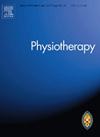随机对照试验中非特异性颈部疼痛匹配干预措施的报告质量及其与试验结果的关联:一项系统评价的二次分析
IF 3
3区 医学
Q1 REHABILITATION
引用次数: 0
摘要
运动和手工疗法被推荐用于治疗非特异性颈部疼痛(NSNP),但大多数随机对照试验(RCT)尚未确定对每种干预措施反应最佳的特定亚组。虽然在短期内发现匹配运动优于不匹配干预,但有效性估计的高度异质性和干预保真度和交付质量的可变水平可能导致匹配或分层护理有效性的结果不一致。目的评价随机对照试验中对NSNP进行匹配与不匹配运动或手工治疗干预的干预报告质量及其与治疗效果估计的关系。设计采用荟萃分析对系统综述进行二次分析。方法对于所有纳入的随机对照试验,独立审稿人使用TIDieR检查表对干预报告的质量进行评定。meta回归用于评估短期疼痛和残疾结局的TIDieR评分与治疗效果评估(改变评分的标准化平均差异)之间的关联方向和程度。结果干预保真度相关项目未得到充分报道。使用的材料、干预提供者、位置和修改报告不一致。干预报告质量较差与短期疼痛和残疾的治疗效果估计较大相关,有利于匹配的干预措施。结论干预报告不充分的试验可能高估了匹配运动或手工治疗对NSNP的益处。由于缺乏足够的信息来判断该领域干预的保真度,因此需要在研究设计、实施和报告的这一特定方面提供更好的指导。•在比较非特异性颈部疼痛的匹配与不匹配运动或手工治疗的试验中,干预保真度的报告是次优的。•干预报告完整性较差的试验倾向于支持匹配的干预措施本文章由计算机程序翻译,如有差异,请以英文原文为准。
Quality of reporting matched interventions for non-specific neck pain in randomised controlled trials and its association with trial outcomes: a secondary analysis of a systematic review
Background
Exercise and manual therapy are recommended for managing non-specific neck pain (NSNP), but most randomised controlled trials (RCT) have not identified specific subgroups that might respond best to each intervention. Although matched exercise was found to be superior to unmatched interventions in the short term, high heterogeneity in effectiveness estimates and variable levels of intervention fidelity and quality of delivery may contribute to inconsistent findings on the effectiveness of matched or stratified care.
Objectives
To assess the quality of intervention reporting and its relationship to treatment effect estimates in RCTs comparing matched versus unmatched exercise or manual therapy interventions for NSNP.
Design
Secondary analysis of a systematic review with meta-analysis.
Methods
For all included RCTs, independent reviewers rated the quality of intervention reporting using the TIDieR checklist. Meta-regression was used to assess the direction and magnitude of association between TIDieR scores and treatment effect estimates (standardised mean difference of change scores) for short-term pain and disability outcomes.
Results
The items related to intervention fidelity were not adequately reported. Materials used, intervention provider, location and modification were inconsistently reported. Poorer quality of intervention reporting was associated with larger treatment effect estimates in short-term pain and disability in favour of matched interventions.
Conclusions
Trials with inadequate intervention reporting may overestimate the benefits of matched exercise or manual therapy treatments for NSNP. The lack of SUFFICIENT information to judge intervention fidelity in this field reinforces the need for better guidance on this specific aspect of study design, conduct, and reporting.
Contribution of the Paper
- •Reporting of intervention fidelity in trials comparing matched versus unmatched exercise or manual therapy in non-specific neck pain is sub-optimal.
- •Trials with poorer completeness of intervention reporting tend to favour matched interventions
求助全文
通过发布文献求助,成功后即可免费获取论文全文。
去求助
来源期刊

Physiotherapy
医学-康复医学
CiteScore
6.40
自引率
3.00%
发文量
377
审稿时长
82 days
期刊介绍:
Physiotherapy aims to publish original research and facilitate continuing professional development for physiotherapists and other health professions worldwide. Dedicated to the advancement of physiotherapy through publication of research and scholarly work concerned with, but not limited to, its scientific basis and clinical application, education of practitioners, management of services and policy.
We are pleased to receive articles reporting original scientific research, systematic reviews or meta-analyses, theoretical or debate articles, brief reports and technical reports. All papers should demonstrate methodological rigour.
 求助内容:
求助内容: 应助结果提醒方式:
应助结果提醒方式:


